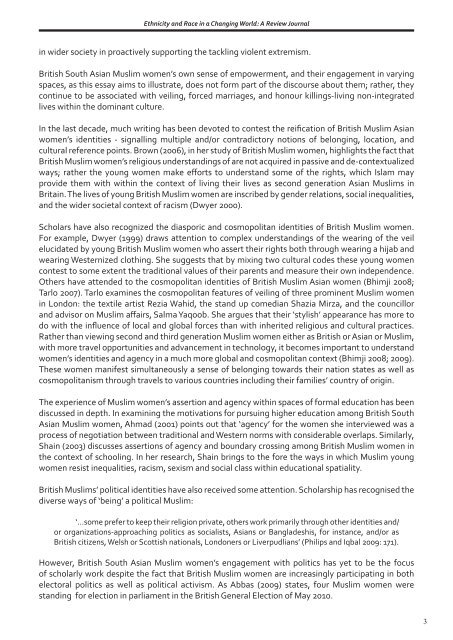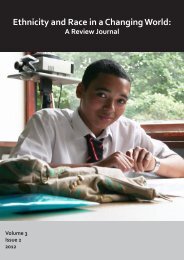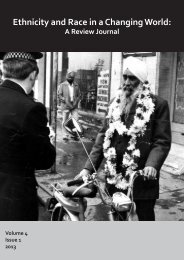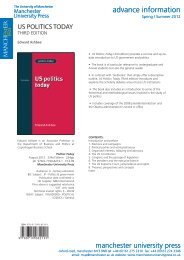Ethnicity and Race in a Changing World
Volume 2, Issue 1, 2010 - Manchester University Press
Volume 2, Issue 1, 2010 - Manchester University Press
- No tags were found...
Create successful ePaper yourself
Turn your PDF publications into a flip-book with our unique Google optimized e-Paper software.
<strong>Ethnicity</strong> <strong>and</strong> <strong>Race</strong> <strong>in</strong> a Chang<strong>in</strong>g <strong>World</strong>: A Review Journal<strong>in</strong> wider society <strong>in</strong> proactively support<strong>in</strong>g the tackl<strong>in</strong>g violent extremism.British South Asian Muslim women’s own sense of empowerment, <strong>and</strong> their engagement <strong>in</strong> vary<strong>in</strong>gspaces, as this essay aims to illustrate, does not form part of the discourse about them; rather, theycont<strong>in</strong>ue to be associated with veil<strong>in</strong>g, forced marriages, <strong>and</strong> honour kill<strong>in</strong>gs-liv<strong>in</strong>g non-<strong>in</strong>tegratedlives with<strong>in</strong> the dom<strong>in</strong>ant culture.In the last decade, much writ<strong>in</strong>g has been devoted to contest the reification of British Muslim Asianwomen’s identities - signall<strong>in</strong>g multiple <strong>and</strong>/or contradictory notions of belong<strong>in</strong>g, location, <strong>and</strong>cultural reference po<strong>in</strong>ts. Brown (2006), <strong>in</strong> her study of British Muslim women, highlights the fact thatBritish Muslim women’s religious underst<strong>and</strong><strong>in</strong>gs of are not acquired <strong>in</strong> passive <strong>and</strong> de-contextualizedways; rather the young women make efforts to underst<strong>and</strong> some of the rights, which Islam mayprovide them with with<strong>in</strong> the context of liv<strong>in</strong>g their lives as second generation Asian Muslims <strong>in</strong>Brita<strong>in</strong>. The lives of young British Muslim women are <strong>in</strong>scribed by gender relations, social <strong>in</strong>equalities,<strong>and</strong> the wider societal context of racism (Dwyer 2000).Scholars have also recognized the diasporic <strong>and</strong> cosmopolitan identities of British Muslim women.For example, Dwyer (1999) draws attention to complex underst<strong>and</strong><strong>in</strong>gs of the wear<strong>in</strong>g of the veilelucidated by young British Muslim women who assert their rights both through wear<strong>in</strong>g a hijab <strong>and</strong>wear<strong>in</strong>g Westernized cloth<strong>in</strong>g. She suggests that by mix<strong>in</strong>g two cultural codes these young womencontest to some extent the traditional values of their parents <strong>and</strong> measure their own <strong>in</strong>dependence.Others have attended to the cosmopolitan identities of British Muslim Asian women (Bhimji 2008;Tarlo 2007). Tarlo exam<strong>in</strong>es the cosmopolitan features of veil<strong>in</strong>g of three prom<strong>in</strong>ent Muslim women<strong>in</strong> London: the textile artist Rezia Wahid, the st<strong>and</strong> up comedian Shazia Mirza, <strong>and</strong> the councillor<strong>and</strong> advisor on Muslim affairs, Salma Yaqoob. She argues that their ‘stylish’ appearance has more todo with the <strong>in</strong>fluence of local <strong>and</strong> global forces than with <strong>in</strong>herited religious <strong>and</strong> cultural practices.Rather than view<strong>in</strong>g second <strong>and</strong> third generation Muslim women either as British or Asian or Muslim,with more travel opportunities <strong>and</strong> advancement <strong>in</strong> technology, it becomes important to underst<strong>and</strong>women’s identities <strong>and</strong> agency <strong>in</strong> a much more global <strong>and</strong> cosmopolitan context (Bhimji 2008; 2009).These women manifest simultaneously a sense of belong<strong>in</strong>g towards their nation states as well ascosmopolitanism through travels to various countries <strong>in</strong>clud<strong>in</strong>g their families’ country of orig<strong>in</strong>.The experience of Muslim women’s assertion <strong>and</strong> agency with<strong>in</strong> spaces of formal education has beendiscussed <strong>in</strong> depth. In exam<strong>in</strong><strong>in</strong>g the motivations for pursu<strong>in</strong>g higher education among British SouthAsian Muslim women, Ahmad (2001) po<strong>in</strong>ts out that ‘agency’ for the women she <strong>in</strong>terviewed was aprocess of negotiation between traditional <strong>and</strong> Western norms with considerable overlaps. Similarly,Sha<strong>in</strong> (2003) discusses assertions of agency <strong>and</strong> boundary cross<strong>in</strong>g among British Muslim women <strong>in</strong>the context of school<strong>in</strong>g. In her research, Sha<strong>in</strong> br<strong>in</strong>gs to the fore the ways <strong>in</strong> which Muslim youngwomen resist <strong>in</strong>equalities, racism, sexism <strong>and</strong> social class with<strong>in</strong> educational spatiality.British Muslims’ political identities have also received some attention. Scholarship has recognised thediverse ways of ‘be<strong>in</strong>g’ a political Muslim:‘…some prefer to keep their religion private, others work primarily through other identities <strong>and</strong>/or organizations-approach<strong>in</strong>g politics as socialists, Asians or Bangladeshis, for <strong>in</strong>stance, <strong>and</strong>/or asBritish citizens, Welsh or Scottish nationals, Londoners or Liverpudlians’ (Philips <strong>and</strong> Iqbal 2009: 171).However, British South Asian Muslim women’s engagement with politics has yet to be the focusof scholarly work despite the fact that British Muslim women are <strong>in</strong>creas<strong>in</strong>gly participat<strong>in</strong>g <strong>in</strong> bothelectoral politics as well as political activism. As Abbas (2009) states, four Muslim women werest<strong>and</strong><strong>in</strong>g for election <strong>in</strong> parliament <strong>in</strong> the British General Election of May 2010.3






